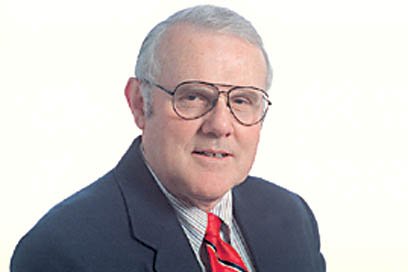It’s very clear that philanthropist E.W. Firstenburg put his money where his heart was, but even with that abundance of evidence, it’s difficult to adequately portray the depth of his commitment and love of community.
If more of us could follow in the footsteps of community support and appreciation, Vancouver and Clark County would be a better place. E.W. died on Aug. 21 at age 97, leaving a spirit that was built on the foundation of livability and which expands through volunteerism and generosity.
In celebrating its 100th anniversary this year, First Independent Bank commissioned a book: “Reflections — The First 100 Years.” It was “dedicated to the exceptional community of neighbors that is the heart and soul of Southwest Washington.”
Firstenburg, the founder of First Independent Bank, began his banking network in Ridgefield at Ridgefield State Bank, now the town’s City Hall.
As “Spudders” by residency or contact, E.W. and I remained in touch over the years. “Spudders,” by the way, is the nickname of Ridgefield High Schools sports teams. I have taken great pride in telling people I am a Spudder through graduation.
Back to E.W. and his community support: On May 23, 2007, I wrote a column about visiting the Ridgefield branch of First Independent. It was the first time in 60 years I had been to the “E.W. Bank” in the town.
More than 50 years earlier, I visited the bank as a child with my mother while she negotiated a loan of $500 to repair our damaged bridge over Whipple Creek to the farm in Sara. The bank’s representative was a tall, lanky fellow named Ed Firstenburg. We got the loan.
Unforgotten
Years later, when I recalled that episode at lunch with Ed and Mary at the Waterford retirement residence, I was astonished to find E.W. remembered details of that earlier meeting. I was impressed, too, with his memories of his 40 years living in Ridgefield.
We reminisced that day about the character of the town, its agricultural emphasis on growing potatoes (hence “Spudders” — or “Tater Tots” if you were a younger student), adventures on Lake River and the characteristics of its small-town charm, such as no parking meters (which exist today). Ed’s mind was keen and focused, and his voice strong, sometimes forceful.
Ed talked of his bicycling through Cascade Park from the Waterford. Firstenburg took great pride in establishing the Waterford branch of First Independent and working at the branch office.
I noticed the love and attention he lavished on Mary, his wife for 72 years. While Mary did not join in the table conversation that day, Ed paid constant attention to her.
Back to the banks book: “Reflections” is the story of First Independent, to be sure, but also a tribute to the community where Firstenburg spent nearly a century of his life. It speaks of our ancestors, “rugged individuals … who had an instinctive appreciation of this wonderful place and the sense of community it engendered.”
Firstenburg was not “Mr. Firstenburg” to his employees. He was Ed or E.W., and he took a personal interest in them. His job performance critiques were sometimes cloaked in humor. Informal or serious, no one misunderstood the message.
During World War II, Ridgefield State Bank remained open until 9 p.m. to accommodate second-shift Kaiser Shipyard workers. Everything was rationed, and nylon hose cost 20 cents a pair, if you could find any. The response to shortages: “Don’t ya know there’s a war on?” The shipyards employed 38,000 workers, 10,000 of them women, according to “Reflections.” Alcoa consumed a great block of Bonneville’s cheap hydropower, and Sam Shoen and his wife, Anna Mary, took out a loan from Firstenburg for the first U-Haul trailer. Sales of war bonds were brisk, with full energy directed to “win the war.”
Marking 100 years, the bank moved ahead, helping the region advance boldly into the 21st century. No doubt, E.W. was First Indy’s chief strategist. The bank helps define his legacy, and so do his countless contributions to Clark County.



